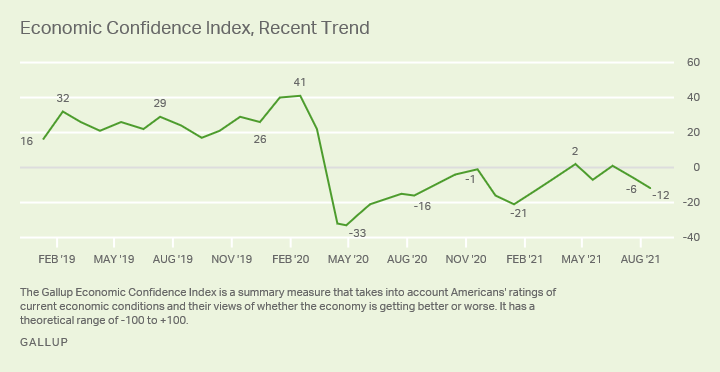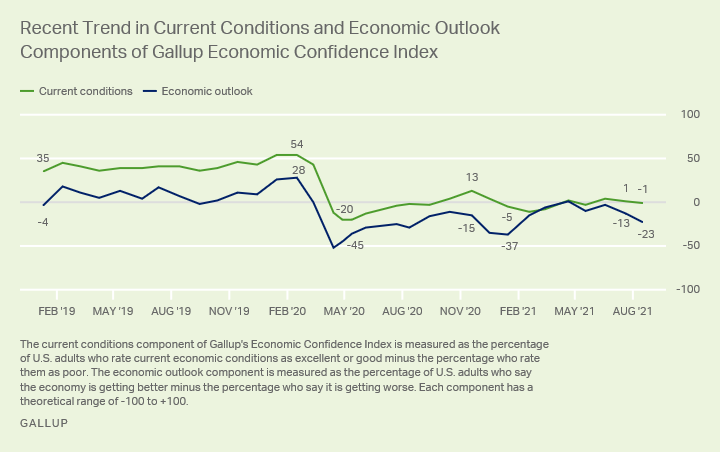STORY HIGHLIGHTS
- Economic Confidence Index slips to -12, from -6 in July and +2 in April
- Ratings of current economy stable; more see economy getting worse in future
(Gallup) Gallup’s Economic Confidence Index dropped to -12 from -6 in July and is now back to the level it was at in February. The index remains better than its pandemic low point of -33 in April 2020 but is still well below the +41 Gallup measured right before the pandemic took hold.

Line graph. Recent trend in Gallup’s Economic Confidence Index. The index summarizes Americans’ ratings of current economic conditions and their views of whether the economy is getting better or worse. It has a theoretical range of -100 to +100. The index was consistently positive in 2019 and early 2020, ranging from +16 to +32. It fell to -33 in late April 2020 and has mostly recovered since then, hitting positive territory at +2 in April 2021. Since then it has slid back to -12, the lowest since -13 in February 2021.
Gallup’s Economic Confidence Index summarizes Americans’ views of the economy, including their evaluation of current economic conditions and their perception of whether the economy is getting better or getting worse. It has a theoretical range of -100 to +100, the former occurring if all Americans rated economic conditions as poor and thought the economy was getting worse, and the latter if all Americans rated conditions as excellent or good and believed the economy was getting better.
The Aug. 2-17 survey finds Americans are less confident in the economy because they are more likely to perceive the economy is getting worse than they were in July. Their assessment of current economic conditions is statistically unchanged.
In the latest survey, 37% of U.S. adults say the economy is getting better and 60% say it is getting worse, yielding a net -23 score for the “economic outlook” component of the index. In July, 41% believed the economy was getting better and 54% worse, for a -13 economic outlook score.
In August, 28% of Americans rate current economic conditions as excellent or good, 42% as fair and 29% as poor. This results in a -1 score on the “current conditions” component of the index — based on the percentage of excellent and good ratings minus the percentage of poor ratings. Last month, the current conditions index score was +1 (28% excellent or good, 27% poor).

Line graph. Recent trends in Gallup’s Economic Confidence Index components. Both components have a theoretical range of -100 to +100. The current conditions component score is at -1 in August 2021. The economic outlook component score is currently at -23.
Economic confidence fell among Republicans and independents in August, but not among Democrats. Republicans’ ratings of both current conditions and economic outlook worsened, while independents only showed a decline in their economic outlook. Changes in Economic Confidence Ratings, by Political Party, July vs. August 2021
The decline in confidence appears likely tied to the recent increase in coronavirus infections. The August survey found the percentage of Americans naming COVID-19 as the most important problem facing the country doubling, and it is once again the top overall problem mentioned. Meanwhile, mentions of economic problems such as the economy in general, unemployment or inflation showed no meaningful change.
Bottom Line
The pandemic has brought a number of shocks to the U.S. economy. The recovery from widespread business shutdowns in the spring of 2020 has been solid at times and uneven at others. Currently, the economic growth as measured by gross domestic product is healthy, the unemployment rate is decreasing and stock values are at record levels.
At the same time, the U.S. is still well short of the number of jobs it had before the pandemic, and employers are struggling to fill the openings they do have. The latest events in the pandemic may be dampening Americans’ economic optimism if they assume rising infections will cause consumer and hiring activity to slow, as occurred last spring.


